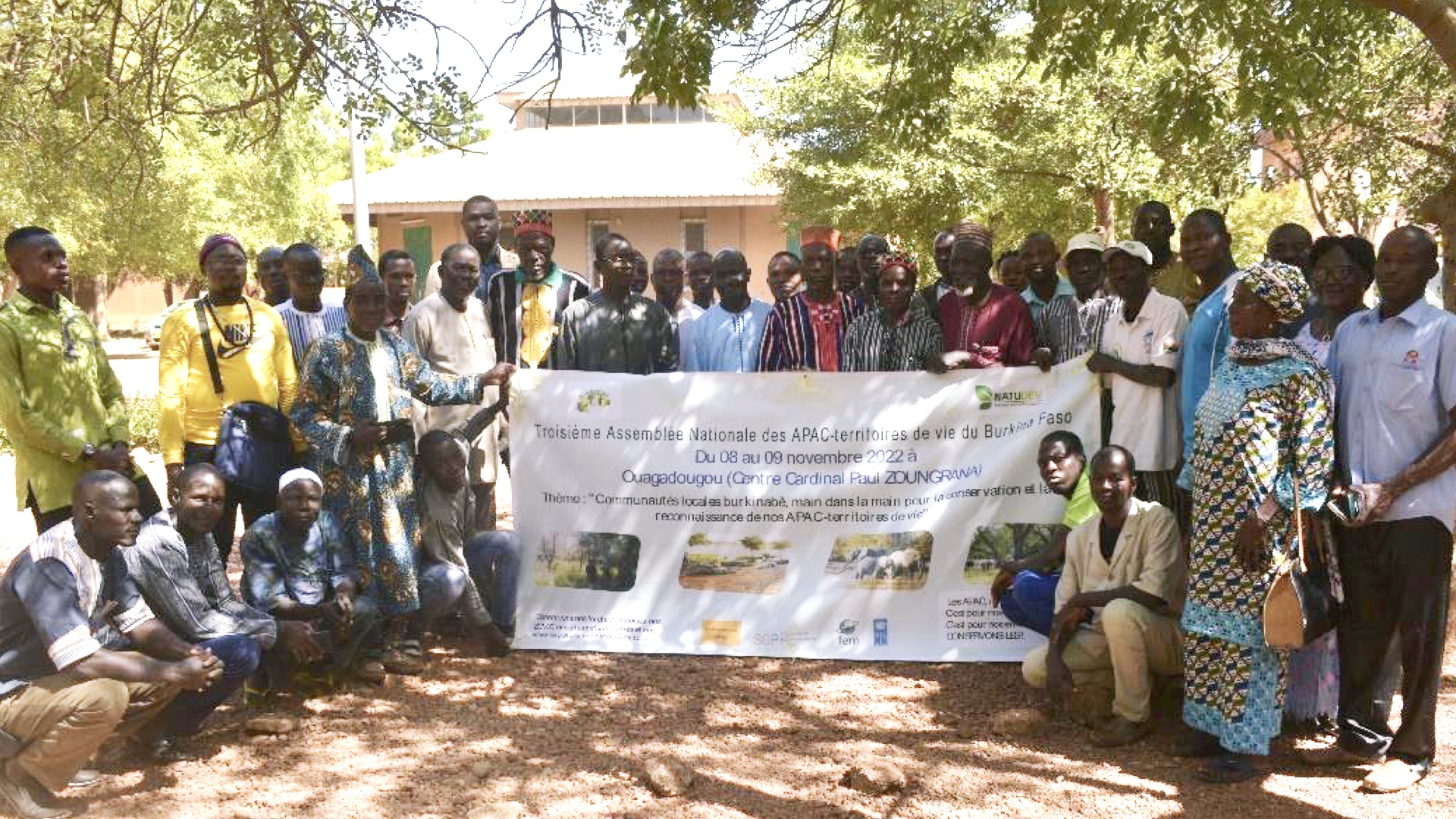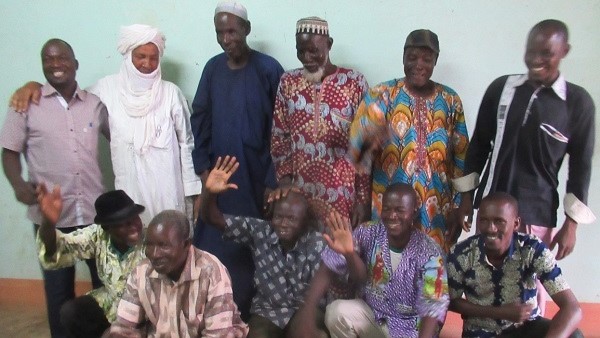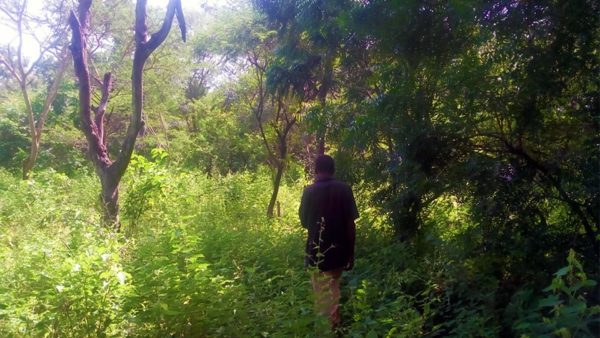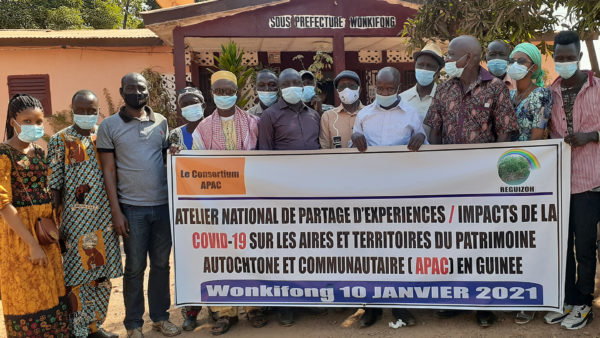In November 2022, the National Association of ICCAs of Burkina Faso and NATUDEV organised the 3rd National Assembly of ICCAs of Burkina Faso. We take a look back at a concrete instance of sharing and commitment between local communities and external partners
First published on 05/18/2023, and last updated on 06/01/2023
Written by Patrice Akiam (Honorary Member of the ICCA Consortium), Evariste Tenkodogo and Alexis Kaboré (respectively, Technical Assistant and President of NATUDEV, Member of the ICCA Consortium).
Edited by Gaëlle Le Gauyer and Mathilde Craker
Translated to English by Josselin Musaada
The third national assembly of Indigenous and Community Conserved Areas and Territories (ICCA – Territories of Life) of Burkina Faso was held on November 8 and 9, 2022. Among the participants, 44 people represented communities from 10 administrative provinces of the country. The two Burkinabe Honorary Members of the ICCA Consortium were also present during the assembly.
Some ICCA partner organisations, including the Global Environment Facility Small Grants Program (GEF/SGP), the West African Economic and Monetary Union (UEMOA) and representatives of the Ministry of Environment, have also actively participated in the meeting. The assembly was organised by the National Association of ICCAs of Burkina Faso (ASAPAC-BF) with the support of the Association Nature et Développement (NATUDEV), focal point of the ICCA movement in Burkina Faso and responsible for coordinating the ICCA Consortium for the Sahel region.
These two days were devoted to sharing experiences between ICCA custodian communities, identifying the difficulties they encountered, proposing solutions and looking forward to the future. A moment was also dedicated to communications from actors working at the local and international levels of the ICCA Consortium.
Sharing experiences between ICCA custodian communities
Twenty-one local communities shared their experiences on the governance and management of their ICCAs. These were village communities from the communes of Sabou, Boulsa, Kombissiri, Pô, Dano, Pella, Soaw, Fada N’Gourma, Tanghin-Dassouri, Dafra, Ipélsé and Barma.
Among the communities present and their support structures, it should be noted that nine of them have benefited from GEF/SGP funding under the GSI (Global Support Initiative for ICCAs) for the implementation of community natural resources conservation actions and for the promotion of the ICCAs movement. Between June 2021 and November 2022, this funding made it possible to:
- Run 2 major networking actions at national and municipal level;
- Create 10 new ICCA custodian associations;
- Adopt 5 local charters for the conservation of community natural sites;
- Map 11 sites – for 2 of these sites, an inventory of forest potential was carried out;
- Raise awareness of the ICCA movement for about 2 000 people; and
- Gradually empower communities through the valorization of natural resources by better producing, processing and marketing forest products (shea butter, honey, etc.).
These actions have all contributed to strengthening the governance and security of fifty ICCAs, mainly sacred sites and village forests, over a total area of approximately six hundred hectares.
Sir Noël Compaoré, National Coordinator of the GEF/SGP, also intervened to provide details on the work of his organisation. It should be emphasised here that the SGP of the GEF was the first and main financial partner of the ICCAs movement in Burkina Faso. Since 2015, i.e. even before the advent of the GSI fund in Burkina Faso in 2021, the GEF/SGP has always supported and encouraged community governance and conservation actions in ICCAs.
Twelve other communities, which are not direct beneficiaries of the GSI, also shared their experiences during this national assembly. These communities can be divided into three main categories according to the type of territory they protect: three communities are custodians of sacred ponds, seven communities are custodians of sacred groves and two communities are custodians of village areas of hunting interest (Zovic)[1].
The sacred ponds of the villages of Bazoulé, Sabou and Dafra
The sacred crocodile pond in the village of Bazoulé is entirely governed and managed by the community of the village, through its traditional authorities and the association for the development of tourism in Bazoulé (ATDB), itself composed of inhabitants of the village. The threats to the ecosystem of the pond are mainly the fact that it dries up during the dry season and the reduction in tourist income due to the national security crisis.
In Sabou, the town hall is heavily involved in the governance and tourist management of the sacred crocodile pond, populated by around a hundred individuals. This management includes, among other things, running the restaurant and accommodation grounds as well as visiting the pond and caring for the crocodiles. Consequently, the rights of the community are essentially reduced to the practice of its cultural rites. To ensure stronger community representation in decision-making and management activities, a grassroots association is being created.
Finally, in the municipality of Bobo-Dioulasso, the sacred catfish pond of Dafra is a place of worship where believers come to make their wishes and offerings to obtain fertility, marriage, health, material wealth, peace… Unfortunately, under the combined effects of tourism, modernism and capitalism, we see an increase in behaviours that disregard customs, and this worries the custodians of this nationally famous ICCA.
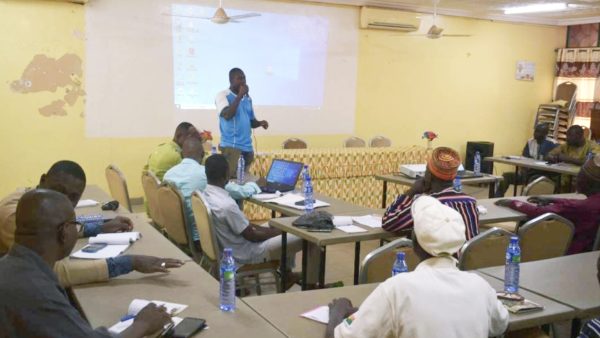
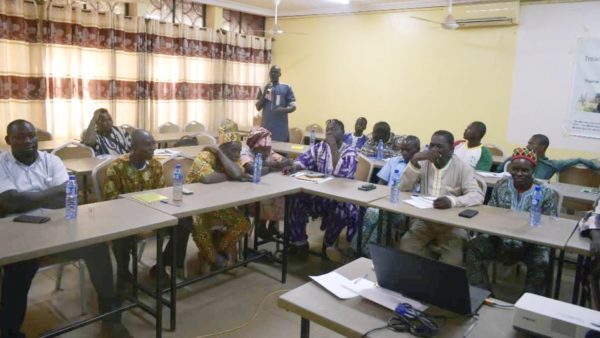
Presentation of the experience of the sacred pond of Bazoulé and the Zovic of Saro. Photo credits: Natudev.
The sacred groves of the villages of Kalwaka and Barama
The Rayimikoudoumdé association (“Let’s not forget our traditions”, in Mooré) is the body that coordinates the conservation actions of the sacred groves and water points in the village of Kalwaka. There are about twenty groves and water points and they cover about one hundred hectares. Rayimikoudoumdé is a pioneer of the ICCAs movement in the municipality of Soaw. Its exemplarity has encouraged the emergence of ICCA custodian associations in 4 other villages in the municipality of Soaw. These associations were federated to give birth to the Rawidi-Koudoumdé municipal association (“Let’s not despise our traditions”, in Mooré) whose mission is to defend ICCAs at the municipal level.
The village of Barama has a village forest of 97 hectares which also houses sacred sites. Delimitation and mapping work has already been carried out there. Each year, members of the community get together to build firebreaks in order to reduce the impact of bushfires on the rest of the forest. Despite these efforts, the proximity of the forest to the national road n°2 and to Ouagadougou, the capital of the country, increases the risks of deterioration. For example, some people leave their household litter in the forest. But what worries the community the most is the pressure from private companies in the real estate sector, as they have already taken over large areas in the neighbouring villages of Barama.
The Zovic of Saro and Sadpenga
The communities of Sadpenga (East region) and Saro (Centre-South region) have in common the same type of ICCA: they are Zovic. Zovic are community forests dedicated to the conservation of wildlife and their habitat. In the current context of a growing security crisis in Burkina Faso, it has been noticed that the Zovic show greater resilience than conventional protected areas, as many are occupied by non-state armed groups.
Contextualizing ICCAs – territories of life
In addition to the exchange of experiences between local communities, five interventions contributed to a better understanding of the international and national contexts in which Burkina Faso’s ICCAs are governed and managed.
First of all, so that everyone and in particular people new to ICCAs can keep up during the exchanges, Dr. Alexis Kaboré gave a reminder on the notion of ICCA – territory of life and its realities in Burkina Faso. Dr. Alexis Kaboré is the president of NATUDEV, the association that ensures the regional coordination of the ICCA Consortium for the Sahel, and its focal point in Burkina Faso.
Christian Chatelain, Co-coordinator of the ICCA Consortium for Africa[2], also touched upon the meaning of the notion of ICCAs – territories of life during his virtual intervention. He underlined the contribution of ICCAs to achieving the “30×30” objective of the post-2020 global biodiversity framework and recalled the procedures to follow for the addition of an ICCA to the global ICCA registry.
Securing ICCAs and legal framework in Burkina Faso
Two guests also provided information on the Burkinabe legislative framework. Clark Lungren, founder and director of the Center for the Development of Wildlife Production in Ouagadougou, presented the history of Zovics, one of the main types of ICCAs in Burkina Faso, and explained the reasons for his faith in community governance of natural spaces. In particular, he told us that it is this conviction that has motivated and guided him in his support of the notion of Zovic since the concept was born in the late 1980s.
For his part, the Executive Director of Legal and Institutional Affairs of the Ministry of the Environment, Gontran Somé, spoke about the legal status applicable to the rights of communities in the field of natural areas. He insisted on the existence of a substantial legal mechanism applicable to the rights of communities in all of the country’s forests: community rights in state forests, in local authority forests, in community forests and in private forests. Unfortunately, these multiple legal levers are not known well enough, especially by local communities.
He also acknowledged the lack of a law specifically dedicated to ICCAs – territories of life, while insisting on the fact that the Forest Code of Burkina has instruments allowing local communities to become owners of their territories of life in their own right. For example, the Forest Code indicates that, to become the owner of a private natural space, whether individual or collective, it is sufficient to obtain a Certificate of Possession of Rural Land (APFR) or a land title. This certificate or title allows the individual or community that obtains it to fully enjoy their rights in the area concerned. Thus, nothing prohibits a community or a village from owning a private forest. However, owners must respect the Forest Code and the restrictions concerning these so-called private spaces.
These communications sparked lively discussions. The most frequent debates were about the lack of respect of customary and legislative rules within the communities themselves, as well as by certain authorities. It was also stressed on several occasions that the ICCA approach constitutes a real opportunity for these communities and their territories. To conclude, it is the transversal and joint mobilisation of all categories of actors, alongside the village communities that are already mobilised, which was recommended.
Main actions planned for 2023
This third national assembly made it possible to decide on the actions to be implemented in the upcoming year. The following priorities emerged from the discussions:
- Produce the audio transcript of the Self-Strengthening Process (SSP) in the local language (Mooré);
- Produce a video to show the outcomes and progress made by the ICCA projects funded by the GSI;
- Continue to communicate and raise awareness of the ICCAs movement;
- Organise a national training and information workshop on ICCAs for the people working in the technical services in charge of the environment;
- Develop a safety index of ICCAs in Burkina Faso;
- Restore the plant cover of sacred groves by reforesting with local species;
- Register at least one ICCA from Burkina Faso in the global ICCA registry;
- Hold a General Assembly to welcome new members of ASAPAC-BF;
- Pursue the process of decentralisation of ASAPAC-BF at municipal, provincial and regional levels.
[1] A Zovic is a village area of hunting interest, i.e. a “part of the land of a grassroots community, affected by it for the exploitation of hunting resources” (article 103 of the law N°003-2011/AN of 5 April 2011 on the forestry code of Burkina Faso). According to the same article 103: “the creation of a Zovic is proposed by the minutes of a meeting of the competent village body and confirmed by an order of the competent local authority”. See this NATUDEV article for more information.
[2] Christian Chatelain is now the Technical Advisor of the ICCA Consortium.
